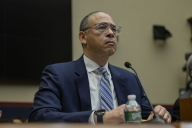You have /5 articles left.
Sign up for a free account or log in.
WASHINGTON -- Weeks after the U.S. Education Department issued softened regulations designed to ensure that vocational programs prepare graduates for "gainful employment," House Republicans made abundantly clear Friday that, in their view, the rules had not been eased nearly enough, and that they would continue to oppose them.
Those signals came at a joint hearing involving two House subcommittees -- the postsecondary education panel of the House Committee on Education and the Workforce, and the House Oversight and Government Reform Subcommittee on Regulatory Affairs, Stimulus Oversight and Government Spending. The panels' Republican members called the hearing and used it to continue to raise questions about the fairness of the regulations and to vow to fight them -- though without specifying how. Democrats took advantage of the opportunity to criticize for-profit colleges for complaining about regulations that they said had been watered down to the point that they would affect relatively small numbers of "bad actors."
The gainful employment rules would eliminate federal student-aid funding for for-profit postsecondary programs (as well as vocational certificate programs at nonprofit institutions) whose graduates don't achieve certain levels of employment, income or loan repayment. Obama administration officials have characterized the regulations as necessary to protect students from for-profit institutions that use predatory tactics to recruit as many students as possible -- even those unlikely to succeed -- and to keep taxpayer money from going to colleges with low rates of success.
Opponents argue that the regulations single out for-profit colleges unfairly and put an undue burden on them by forcing them to expend resources collecting and reporting the data. Three of the four witnesses testifying at Friday's hearing also said that the regulations disproportionately affect low-income minority students, who make up large percentages of students at for-profit colleges.
"Minority students are already at a great disadvantage," said Harry Alford, president of the National Black Chamber of Commerce, "and now the Education Department has made it worse by shutting down a major path toward education and jobs."
Alford said that many of his constituents, the owners of black businesses, see for-profit institutions as an important pipeline for their employees. Minority advocacy groups have been split on the issue -- several prominent civil rights groups, including the NAACP, have come out in favor of the new rules as a way to protect low-income and minority students, but other groups advocating on behalf of minority Americans, including the National Caucus of Hispanic State Legislators, are opposed to them.
Dario Cortes, president of Berkeley College, a for-profit college with eight campuses in New York and New Jersey, said the department's planned use of earnings data from the Social Security Administration to calculate the debt-to-income ratios for individual programs is problematic because privacy rules will bar institutions from challenging the department's findings. Cortes said Berkeley lacks the resources to conduct internal surveys, which the department has offered as an alternative.
"Most institutions, particularly smaller, family-owned schools, do not have the staff or the capability to conduct National Center for Education Statistics-caliber internal surveys," he said.
Witnesses urged lawmakers to try to stop the regulations from taking full effect. The House passed legislation this spring aimed at stopping the department from promulgating the gainful employment rule, but it made no headway in the Democratic-controlled Senate.
Democrats used most of their time at Friday's hearing asking questions of Anthony Carnavale director of Georgetown University's Center on Education and the Workforce and the only witness who did not vocally oppose the gainful employment rules. A few Democrats, including Reps. George Miller and Maxine Waters of California, spent most of their time blasting critics of gainful employment, saying the regulations are mild and will affect a tiny proportion of for-profit institutions.
"We have a rule that probably does not do much more than develop a lot of information," said Miller. "But I think that's a minimum that we can ask, as members of Congress, on behalf of the taxpayers."








